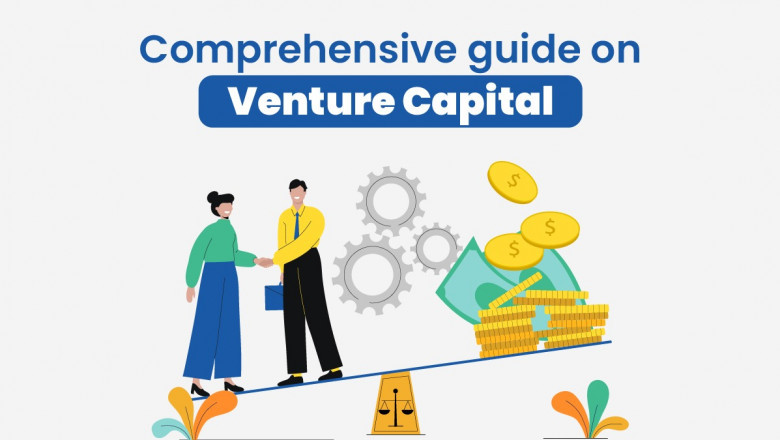views
Are you exploring ways to secure significant funding for your startup? Understanding venture capital is essential for any entrepreneur aiming to scale their business. This guide delves into what venture capital is, its various types, how to raise it, and the benefits and challenges associated with working with venture capital firms.
What is Venture Capital for Startups?
Venture capital refers to large-scale funding provided by specialized firms in exchange for equity in startups. These firms pool resources from high-net-worth individuals (HNIs) and institutional investors to invest in startups with high growth potential. By offering financial resources, operational guidance, and strategic advice, venture capitalists aim to generate significant returns while helping startups succeed.
Venture capitalists typically invest in startups that have:
-
Proven market traction
-
A strong minimum viable product (MVP)
-
High growth potential
However, in exceptional cases, they may invest in pre-seed stages to fund the development of an MVP or conduct market research. Over time, venture capitalists plan their exit strategy—such as through acquisitions, IPOs, or secondary sales—to realize profits.
Types of Venture Capital Funding
Before raising venture capital for startups, it’s crucial to understand the funding stages:
-
Seed Funding
-
For startups in the ideation phase with no established product.
-
Used for MVP development, market research, and refining the business model.
-
-
Series A Funding
-
Focuses on startups with a proven MVP and initial market traction.
-
Funds are used for scaling production, marketing, and expanding market reach.
-
-
Expansion Funding
-
Supports startups entering new markets, targeting broader audiences, or adopting advanced technologies.
-
-
Late-Stage Funding
-
For well-established startups seeking additional capital for scaling operations, improving infrastructure, or preparing for an IPO.
-
-
Bridge Financing
-
Provides short-term capital for startups pursuing mergers, acquisitions, or IPOs.
-
How to Raise Venture Capital for Startups
Follow these steps to secure venture capital:
-
Identify Potential Venture Capitalists
-
Research firms that specialize in your industry and align with your business goals.
-
Evaluate their track records, expertise, and the level of competition among applicants.
-
-
Initial Contact
-
Reach out via email or referrals to schedule introductory meetings.
-
Prepare a concise elevator pitch that highlights your startup’s value proposition.
-
-
Develop a Winning Pitch Deck
-
Include essential details: business model, market analysis, financial projections, and potential ROI.
-
Clearly demonstrate the problem your startup solves and the market opportunity.
-
-
Due Diligence
-
Be prepared with all necessary documentation, including legal, financial, and operational records.
-
Venture capitalists will assess your startup’s viability and risks.
-
-
Negotiate Terms
-
Discuss the amount of funding, equity dilution, and any additional support offered.
-
Aim for a balance between securing capital and retaining decision-making control.
-
-
Finalize the Agreement
-
Draft and sign a formal agreement detailing investment terms, equity distribution, and exit strategies.
-
Advantages of Venture Capital for Startups
-
Expert Guidance
-
Access to industry-specific advice and mentorship.
-
-
Debt-Free Financing
-
Unlike loans, venture capital does not require repayment.
-
-
Networking Opportunities
-
Leverage the firm’s connections to gain access to customers, partners, and additional investors.
-
-
Scalable Growth
-
Secure the resources needed to expand rapidly.
-
Challenges of Venture Capital for Startups
-
Equity Dilution
-
Giving up ownership can reduce your control over the business.
-
-
Performance Pressure
-
Venture capitalists expect high returns, often leading to intense scrutiny and pressure.
-
-
Potential Conflicts
-
Differences in vision and goals can lead to disagreements between founders and investors.
-
-
Loss of Autonomy
-
Significant decisions may require approval from the investors.
-
Conclusion
Venture capital offers startups the opportunity to secure large-scale funding, expert guidance, and valuable connections. However, it’s crucial to weigh the benefits against potential drawbacks, such as equity dilution and performance expectations. By understanding the types of venture capital funding and preparing thoroughly, startups can position themselves for successful fundraising.
At 21By72, we help startups connect with global investors through our flagship Global Startup Summit. Whether you’re seeking seed funding or Series A investments, our platform fosters meaningful connections between entrepreneurs and venture capitalists worldwide. Visit our website to learn more about our events and networking opportunities.
FAQs
-
How long does it take to raise venture capital?
-
The process typically takes 6-8 months from initial contact to securing funds.
-
-
What percentage of equity do venture capitalists usually demand?
-
Equity dilution can range from 10% to 30%, depending on the investment size and startup potential.
-
-
How can networking help in raising venture capital?
-
Networking increases your visibility among investors and can lead to valuable referrals, accelerating the fundraising process.
-






















Comments
0 comment